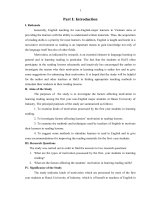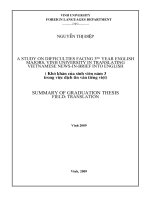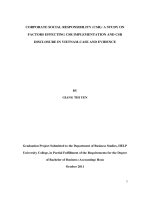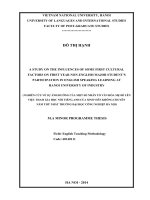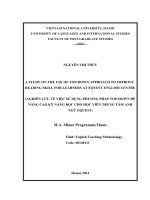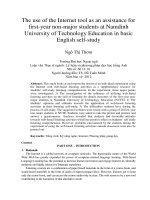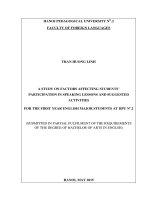A study on factors affecting first year english major students’ motivation in english speaking classes at hanoi pedagogical university 2
Bạn đang xem bản rút gọn của tài liệu. Xem và tải ngay bản đầy đủ của tài liệu tại đây (940.95 KB, 62 trang )
HANOI PEDAGOGICAL UNIVERSITY 2
FACULTY OF FOREIGN LANGUAGES
= = == = =
CAO THI VAN ANH
A STUDY ON FACTORS AFFECTING FIRST-YEAR
ENGLISH MAJOR STUDENTS’ MOTIVATION IN ENGLISH
SPEAKING CLASSES AT HANOI PEDAGOGICAL UNIVERSITY 2
(SUBMITTED IN PARTIAL FULFILLMENT OF THE REQUIREMENTS OF
THE DEGREE OF BACHELOR OF PEDAGOGY IN ENGLISH)
Field: English Language Teaching
Hanoi, May 2019
HANOI PEDAGOGICAL UNIVERSITY 2
FACULTY OF FOREIGN LANGUAGES
= = == = =
CAO THI VAN ANH
A CASE STUDY ON FACTORS AFFECTING FIRST-YEAR
ENGLISH MAJOR STUDENTS’ MOTIVATION IN ENGLISH
SPEAKING CLASSES AT HANOI PEDAGOGICAL UNIVERSITY 2
(SUBMITTED IN PARTIAL FULFILLMENT OF THE REQUIREMENTS OF
THE DEGREE OF BACHELOR OF PEDAGOGY IN ENGLISH)
Field: English Language Teaching
SUPERVISORS:
Nguyen Thi Minh Phuong, M.A
Dr. William H. Salazar, Ed.D
Hanoi, May 2019
STATEMENT OF THE AUTHORSHIP
Title: A study on factors affecting first-year English major students’
motivation in English speaking classes at Hanoi Pedagogical University 2
I hereby certify that this thesis is entirely my own work under strict guidance
from my supervisors and no part of this report has been copied or reproduced by me
from other person‟ work without the proper acknowledgements. I have also
provided fully documented references to the work of other researchers.
Date submitted: May 10th 2019
Student
Supervisor 1
Supervisor 2
Cao Thi Van Anh
Nguyen Thi Minh Phuong, M.A
Dr. William H. Salazar, Ed.D
i
ACKNOWLEDGMENT
In the completion of this thesis, first of all, I would like to express my
gratitude to my supervisors, Ms Nguyen Thi Minh Phuong, M.A who taught me
how to organize my thesis and Dr. William H. Salazar, Ed.D who helped me
organize my ideas and how to edit my paper for their experience, guidance,
stimulating suggestions and encouragement throughout my research.
Additionally, I would like to convey my deepest thanks to the lecturers in the
Faculty of Foreign Languages for their advice and assistance in introducing me
many reference materials related to this research project.
I am especially indebted to 50 first-year English major students at Hanoi
Pedagogical University 2 for their participation into my study.
Last but not least, I owe my special thanks to my loving parents, my younger
brother and my dear friends who offered me their love, care, support and
encouragement so that I could accomplish my study.
Hanoi, May 2019
ii
ABSTRACT
Motivation is one of the most vital factors determining the success or failure
of students‟ foreign language learning. Without motivation, nothing can be
accomplished. But in spite of that, in reality many students in general and some
students at Hanoi Pedagogical University 2 in particular, do not have enough
motivation to practise speaking English smoothly. While speaking is considered one
of the most important skills when compared with other skills; it is the most essential
skills in our daily lives and is the most effective mean of communication. Therefore,
this study was implemented to investigate the factors affecting first-year English
major students‟ motivation in English speaking classes at Hanoi Pedagogical
University 2. The participants were 50 first-year English major students and three
lecturers of English. Survey questionnaire, interviews and classroom observations
were used as the major data collection instruments. The data were computed and
analyzed. The major findings demonstrated that there were four main groups of
factors that affect students‟ motivation in English speaking classes in order of
importance: (1) Student – related factors (mean = 3.59); (2) Lecturer – related
factors (mean = 3.4); (3) Classroom – related factors (mean = 3.3) and; (4) Course
book – related factors (mean= 2.72). Mean scores of 3.5-5.0 on the 5-point Likert
scale were defined as highly motivated; mean scores of 2.5-3.4 were defined as
moderately motivated; and mean scores defined as lowly motivated were 1.0-2.4.
Based on the findings of this study, implications and suggestions to increase
students‟ positive motivation at Hanoi Pedagogical University 2 were made: 1)
Intrinsic and Extrinsic motivation are very important to increase students‟ speaking
skill level. 2) Lecturers should design interesting activities that are relevant to
students. 3) Lecturers should create a positive classroom environment and show
their enthusiasm in their teaching.
Key words: student motivation, factors affecting motivation, English speaking
classes, first-year English major students, L2 motivation
iii
LIST OF ABBREVIATIONS
HPU2
Hanoi Pedagogical University 2
FFL
Faculty of Foreign Languages
L2
Second language
iv
LIST OF TABLES AND CHARTS
LIST OF TABLES
Table 1: Demographics of the participants ..............................................................22
Table 2: Student – related factors .............................................................................23
Table 3: Lecturer – related factors ...........................................................................26
Table 4 : Classroom – related factors ......................................................................29
Table 5 : Course book – related factors ...................................................................31
Table 6: The comparison among four factors ...........................................................33
LIST OF CHARTS
Chart 1: Student – related factors .............................................................................23
Chart 2: Lecturer – related factors ...........................................................................26
Chart 3: Classroom – related factors .......................................................................29
Chart 4 : Course book – related factors ...................................................................31
Chart 5 : The comparison among four factors .........................................................33
v
TABLE OF CONTENTS
PART A. INTRODUCTION ...................................................................................... 1
1. RATIONALE .......................................................................................................... 1
2. AIMS OF THE STUDY.......................................................................................... 2
3. RESEARCH QUESTIONS ..................................................................................... 3
4. METHOD OF THE STUDY .................................................................................. 3
5. SCOPE OF THE STUDY ....................................................................................... 3
6. SIGNIFICANCE OF THE STUDY ........................................................................ 3
7. DESIGN OF THE STUDY ..................................................................................... 4
PART B. DEVELOPMENT ....................................................................................... 5
CHAPTER ONE: LITERATURE REVIEW .............................................................. 5
1.1. Motivation in Second/ Foreign Language Learning ............................................ 5
1.1.1. Definition of Motivation ................................................................................... 5
1.1.2. Definition of Motivation in L2 Acquisition ...................................................... 6
1.1.3. Motivation in Practising English Speaking Skills............................................ 6
1.1.4. Types of Motivation .......................................................................................... 7
1.1.4.1. Intrinsic and Extrinsic Motivation ................................................................. 7
1.1.4.2. Integrative and Instrumental Motivation........................................................ 8
1.2. Motivation in L2 Speaking Classroom ................................................................ 9
1.2.1. Related Issues of Speaking Skills ..................................................................... 9
1.2.1.1. Some Definitions of Speaking Skills ............................................................. 9
1.2.1.2. Types of Classroom Speaking Performance ................................................ 10
3.2. Motivation in Speaking Classroom .................................................................... 10
3.2.1. Factors Demotivate Students to Speak in Classes .......................................... 10
3.2.2. Some Conditions for Effective Motivation in Speaking Classroom ............... 11
1.3. Factors Affecting Motivation in L2 Learning .................................................... 12
1.3.1. Dornyei‟s Extended Motivational Framework ............................................... 12
1.3.2. Williams and Burden‟s Framework of the L2 Motivation .............................. 12
1.3.3. Factors Affecting Students‟ Motivation in Learning L2 ................................. 13
1.3.3.1. Student – related Factors .............................................................................. 13
vi
1.3.3.2. Lecturer – related Factors............................................................................. 14
1.3.3.3. Classroom – related Factors ......................................................................... 15
1.3.3.4. Course book – related Factors ...................................................................... 15
1.3.4. Previous Studies on Factors Affecting Students‟ Motivation in L2
Speaking Class .......................................................................................................... 15
CHAPTER TWO: RESEARCH METHODOLOGY ............................................... 17
2.1. Description and Context of the Study ................................................................ 17
Participants ................................................................................................................ 17
2.2. Data Collection Instruments:.............................................................................. 18
2.2.1. Survey Questionnaire for Students (Appendix A) .......................................... 18
2.2.2. Interview for Lecturers and Students (Appendix B) ....................................... 19
2.2.3. Classroom Observation (Appendix C) ............................................................ 19
2.4. Data Analysis ..................................................................................................... 20
CHAPTER THREE: RESULTS AND DISCUSSION ............................................. 22
3.1. Results ................................................................................................................ 22
3.1.1. Results of Survey Questionnaire, Interviews and Classroom
Observations about Factors Affecting the First-year English Major Students‟
Motivation in English Speaking Classes ................................................................... 22
3.1.1.1. Demographics of the Students taking part in the Survey ............................. 22
3.1.1.2. Student – related Factors .............................................................................. 22
3.1.3. Lecturer – related factors ................................................................................ 25
3.1.4. Classroom – related Factors ............................................................................ 28
3.1.5. Course book – related Factors ......................................................................... 30
3.1.6. The Comparison among Four Factors Affecting Sudents‟ Motivation in
English Speaking Classes .......................................................................................... 32
3.2. Discussion of Findings on Factors Affecting Students‟ Motivation in
English Speaking Classes .......................................................................................... 34
3.2.1. Student – related Factors ................................................................................. 34
3.2.2. Lecturer – related Factors................................................................................ 35
3.2.3. Classroom – related Factors ............................................................................ 36
3.2.4. Course book – related Factors ......................................................................... 36
CONCLUSION ......................................................................................................... 38
vii
1. Summary of the Study ........................................................................................... 38
2. Pedagogical Implications ...................................................................................... 38
3. Limitations of the Study ........................................................................................ 40
4. Suggestions for Future Research ........................................................................... 40
REFERENCES .......................................................................................................... 42
APPENDICES........................................................................................................... 46
viii
PART A
INTRODUCTION
This section discusses the reasons for carrying out this study, defines the
aims of the study, research questions, scope of the study and methods of the study.
The significance of the study and the outline of the study are also presented.
1. RATIONALE
With the globalization trend, English has emerged as a crucial
communication language in Vietnam. Many English-speaking foreigners from many
countries have begun coming and investing in Vietnam. This has prompted
Vietnamese citizens to learn English to communicate efficiently with their foreign
counterparts. Moreover, the importance of English was immediately recognized by
the Vietnamese government and English is taught as a compulsory subject in
primary, secondary, high schools and universities in Vietnam.
English in the modern world plays a very important role in exchanging and
seeking information, for each individual, it has different levels of need. However,
Vietnamese students are facing many opportunities and challenges in the
transitional period of a “developing” globalized Vietnamese society and the
cultivation of English sources is the key to gain educational and career success.
Fluent communication in English will give English learners an advantage in the
competitive job market.
In Vietnam, English language teaching at secondary and high schools
focuses mainly on grammar, vocabulary and sentence structure. In a teaching
format, conversational English is not usually taught because learning and teaching
English is mainly based on testing, with the exams focusing mainly on grammar.
Primary through high school curriculums in many schools focus on preparing
students to pass their entrance exam to the next level, therefore, teachers only teach
the necessary things which help their students to pass the exams; and unfortunately
do not focus on developing students‟ speaking skills. This is one of the reason why
students lose motivation because English is just a subject at school; and is not part
of their lives. Many students fail to understand the significance of the ability to
speak English fluently. At the university level, students who are motivated to
enhance their English speaking skills can pursue a Bachelor of Arts in English or a
Bachelor of English. After graduating, they can be lecturers of English or
1
interpreters in English according to their proficiency. Students in these programs
usually study for four years and the subjects they learn include linguistic and
teaching methods. In fact, teaching methods or classroom environment do not create
opportunities for students to satisfy their communication needs. Therefore,
Vietnamese students have difficulties in communicating in English fluently and
effectively because they do not get the practice they need in English except for a
number of special venues and events such as multinational corporations and
presentation activities. In fact, rarely do we see Vietnamese speaking English unless
it is absolutely necessary. That is the reason why many Vietnamese students are still
deficient in English speaking although they have been studying English since
primary school.
Motivation is an element that plays an important role in inspiring learners to
become proficient in English, esspecially English language learners. It is widely
accepted that the more motivated students are, the more successful they would be at
learning a second/foreign language. It is also undeniable that speaking (any
language) is one of the most essential everyday skills a person needs to function in
society. Therefore, when students have strong motivation to speak English with
accuracy and fluency, they will easily achieve their goals in life.
For the reasons mentioned above, I find that it is really necessary to conduct
a study on factors affecting first-year English major students' motivation in
English speaking classes at Hanoi Pedagogical University 2.
2. AIMS OF THE STUDY
This study aims at investigating the factors affecting first-year English major
students' motivation in English speaking classes at HPU2. This project is carried out
with the following purposes:
- Identifying and analyzing the influence of four factors (student – related
factors, lecturer – related factors, classroom – related factors and course book –
related factors) affecting first-year English major students' motivation in English
speaking classes
- Comparing the levels of effect on these motivational factors
2
3. RESEARCH QUESTIONS
To achieve the research objectives mentioned above, the following research
questions were designed for exploration:
1. How do these four factors (student – related factors, lecturer – related
factors, classroom – related factors and course book – related factors) affect firstyear English major students in English speaking classes at HPU2?
2. What is the comparison among these four factors?
4. METHOD OF THE STUDY
To achieve the objectives of the study, the following research instruments
were used to collect data:
1. Student survey questionnaire
2. Interview (lecturers and students)
3. Classroom observation
Survey questionnaires were used to collect demographic information from
students. In addition, to make the data collected more reliable and authentic, two
following instruments were also applied: interviews with lecturers and students and
classroom observations to find out students and lecturers‟ ideas about the four
factors affecting first-year English major students‟ motivation in English speaking
classes.
5. SCOPE OF THE STUDY
It is clear that motivation has a great impacts on students‟ English language
proficiency. However, this study just makes a limited insight in only a narrow area
– students‟ speaking skills; and focuses on this study of the 50 first-year English
major students at HPU2 instead of all K44 English major students.
6. SIGNIFICANCE OF THE STUDY
This research aims to provide pedagogical implications for educational
administrators, lecturers and students. For more details, the research results can help
those who do quality management teaching at HPU2 have an overall view and wish
to improve the quality of teaching students through the factors in this research
project. Therefore, it is the basis for conducting this research in order for
administrators and lecturers to develop a step-by-step improvement plan to improve
3
the quality of teaching and learning for their school. This research will also help
students to know how the factors influence their speaking‟s motivation and they
will have the capacity to train themselves to enhance their motivation in learning
especially their English speaking skills.
7. DESIGN OF THE STUDY
Apart from the acknowledgment, the references, the appendices, the basic
design of this study consists of the following three parts: Introduction, Development
and Conclusion.
PART A: INTRODUCTION
The introduction discusses the rationale for carrying out this study, defines the
aims of the study, research questions, scope of the study and methods of the study as
well as the significance of the study. The outline of the study is also presented.
PART ��������������������������������������������������������������������������������������������������������������������������������������������������������������������������������������������������������������������������������������������������������������������������������������������������������������������������������������������������������������������������������������������������������������������������������������������������������������������������������������������������������������������������������������������������������������������������������������������������������������������������������������������������������������������������������������������������������������������������������������������������������������������������������������������������������������������������������������������������������������������������������������������������������������������������������������������������������������������������������������������������������������������������������������������������������������������������������������������������������������������������������������������������������������������������������������������������������������������������������������������������������������������������������������������������������������������������������������������������������������������������������������������������������������������������������������������������������������������������������������������������������������������������������������������������������������������������������������������������������������������������������������������������������������������������������������������������������������������������������������������������������������������������������������������������������������������������������������������������������������������������������������������������������������������������������������������������������������������������������������������������������������������������������������������������������������������������������������������������������������������������������������������������������������������������������������������������������������������������������������������������������������������������������������������������������������������������������������������������������������������������������������������������������������������������������������������������������������������������������������������������������������������������������������������������������������������������������������������������������������������������������������������������������������������������������������������������������������������������������������������������������������������������������������������������������������������������������������������������������������������������������������������������������������������������������������������������������������������������������������������������������������������������������������������������������������������������������������������������������������������������������������������������������������������������������������������������������������������������������������������������������������������������������������������������������������������������������������������������������������������������������������������������������������������������������������������������������������������������������������������������������������������������������������������������������������������������������������������������������������������������������������������������������������������������������������������������������������������������������������������������������������������������������������������������������������������������������������������������������������������������������������������������������������������������������������������������������������������������������������������������������������������������������������������������������������������������������������������������������������������������������������������������������������������������������������������������������������������������������������������������������������������������������������������������������������������������������������������������������������������������������������������������������������������������������������������������������������������������������������������������������������������������������������������������������������������������������������������������������������������������������������������������������������������������������������������������������������������������������������������������������������������������������������������������������������������������������������������������������������������������������������������������������������������������������������������������������������������������������������������������������������������������������������������������������������������������������������������������������������������������������������������������������������������������������������������������������������������������������������������������������������������������������������������������������������������������������������������������������������������������������������������������������������������������������������������������������������������������������������������������������������������������������������������������������������������������������������������������������������������������������������������������������������������������������������������������������������������������������������������������������������������������������������������������������������������������������������������������������������������������������������������������������������������������������������������������������������������������������������������������������������������������������������������������������������������������������������������������������������������������������������������������������������������������������������������������������������������������������������������������������������������������������������������������������������������������������������������������������������������������������������������������������������������������������������������������������������������������������������������������������������������������������������������������������������������������������������������������������������������������������������������������������������������������������������������������������������������������������������������������������������������������������������������������������������������������������������������������������������������������������������������������������������������������������������������������������������������������������������������������������������������������������������������������������������������������������������������������������������������������������������������������������������������������������������������������������������������������������������������������������������������������������������������������������������������������������������������������������������������������������������������������������������������������������������������������������������������������������������������������������������������������������������������������������������������������������������������������������������������������������������������������������������������������������������������������������������������������������������������������������������������������������������������������������������������������������������������������������������������������������������������������������������������������������������������������������������������������������������������������������������������������������������������������������������������������������������������������������������������������������������������������������������������������������������������������������������������������������������������������������������������������������������������������������������������������������������������������������������������������������������������������������������������������������������������������������������������������������������������������������������������������������������������������������������������������������������������������������������������������������������������������������������������������������������������������������������������������������������������������������������������������������������������������������������������������������������������������������������������������������������������������������������������������������������������������������������������������������������������������������������������������������������������������������������������������������������������������������������������������������������������������������������������������������������������������������������������������������������������������������������������������������������������������������������������������������������������������������������������������������������������������������������������������������������������������������������������������������������������������������������������������������������������������������������������������������������������������������������������������������������������������������������������������������������������������������������������������������������������������������������������������������������������������������������������������������������������������������������������������������������������������������������������������������������������������������������������������������������������������������������������������������������������������������������������������������������������������������������������������������������������������������������������������������������������������������������������������������������������������������������������������������������������������������������������������������������������������������������������������������������������������������������������������������������������������������������������������������������������������������������������������������������������������������������������������������������������������������������������������������������������������������������������������������������������������������������������������������������������������������������������������������������������������������������������������������������������������������������������������������������������������������������������������������������������������������������������������������������������������������������������������������������������������������������������������������������������������������������������������������������������������������������������������������������������������������������������������������������������������������������������������������������������������������������������������������������������������������������������������������������������������������������������������������������������������������������������������������������������������������������������������������������������������������������������������������������������������������������������������������������������������������������������������������������������������������������������������������������������������������������������������������������������������������������������������������������������������������������������������������������������������������������������������������������������������������������������������������������������������������������������������������������������������������������������������������������������������������������������������������������������������������������������������������������������������������������������������������������������������������������������������������������������������������������������������������������������������������������������������������������������������������������������������������������������������������������������������������������������������������������������������������������������������������������������������������������������������������������������������������������������������������������������������������������������������������������������������������������������������������������������������������������������������������������������������������������������������������������������������������������������������������������������������������������������������������������������������������������������������������������������������������������������������������������������������������������������������������������������������������������������������������������������������������������������������������������������������������������������������������������������������������������������������������������������������������������������������������������������������������������������������������������������������������������������������������������������������������������������������������������������������������������������������������������������������������������������������������������������������������������������������������������������������������������������������������������������������������������������������������������������������������������������������������������������������������������������������������������������������������������������������������������������������������������������������������������������������������������������������������������������������������������������������������������������������������������������������������������������������������������������������������������������������������������������������������������������������������������������������������������������������������������������������������������������������������������������������������������������������������������������������������������������������������������������������������������������������������������������������������������������������������������������������������������������������������������������������������������������������������������������������������������������������������������������������������������������������������������������������������������������������������������������������������������������������������������������������������������������������������������������������������������������������������������������������������������������������������������������������������������������������������������������������������������������������������������������������������������������������������������������������������������������������������������������������������������������������������������������������������������������������������������������������������������������������������������������������������������������������������������������������������������������������������������������������������������������������������������������������������������������������������������������������������������������������������������������������������������������������������������������������������������������������������������������������������������������������������������������������������������������������������������������������������������������������������������������������������������������������������������������������������������������������������������������������������������������������������������������������������������������������������������������������������������������������������������������������������������������������������������������������������������������������������������������������������������������������������������������������������������������������������������������������������������������������������������������������������������������������������������������������������������������������������������������������������������������������������������������������������������������������������������������������������������������������������������������������������������������������������������������������������������������������������������������������������������������������������������������������������������������������������������������������������������������������������������������������������������������������������������������������������������������������������������������������������������������������������������������������������������������������������������������������������������������������������������������������������������������������������������������������������������������������������������������������������������������������������������������������������������������������������������������������������������������������������������������������������������������������������������������������������������������������������������������������������������������������������������������������������������������������������������������������������������������������������������������������������������������������������������������������������������������������������������������������������������������������������������������������������������������������������������������������������������������������������������������������������������������������������������������������������������������������������������������������������������������������������������������������������������������������������������������������������������������������������������������������������������������������������������������������������������������������������������������������������������������������������������������������������������������������������������������������������������������������������������������������������������������������������������������������������������������������������������������������������������������������������������������������������������������������������������������������������������������������������������������������������������������������������������������������������������������������������������������������������������������������������������������������������������������������������������������������������������������������������������������������������������������������������������������������������������������������������������������������������������������������������������������������������������������������������������������������������������������������������������������������������������������������������������������������������������������������������������������������������������������������������������������������������������������������������������������������������������������������������������������������������������������������������������������������������������������������������������������������������������������������������������������������������������������������������������������������������������������������������������������������������������������������������������������������������������������������������������������������������������������������������������������������������������������������������������������������������������������������������������������������������������������������������������������������������������������������������������������������������������������������������������������������������������������������������������������������������������������������������������������������������������������������������������������������������������������������������������������������������������������������������������������������������������������������������������������������������������������������������������������������������������������������������������������������������������������������������������������������������������������������������������������������������������������������������������������������������������������������������������������������������������������������������������������������������������������������������������������������������������������������������������������������������������������������������������������������������������������������������������������������������������������������������������������������������������������������������������������������������������������������������������������������������������������������������������������������������������������������������������������������������������������������������������������������������������������������������������������������������������������������������������������������������������������������������������������������������������������������������������������������������������������������������������������������������������������������������������������������������������������������������������������������������������������������������������������������������������������������������������������������������������������������������������������������������������������������������������������������������������������������������������������������������������������������������������������������������������������������������������������������������������������������������������������������������������������������������������������������������������������������������������������������������������������������������������������������������������������������������������������������������������������������������������������������������������������������������������������������������������������������������������������������������������������������������������������������������������������������������������������������������������������������������������������������������������������������������������������������������������������������������������������������������������������������������������������������������������������������������������������������������������������������������������������������������������������������������������������������������������������������������������������������������������������������������������������������������������������������������������������������������������������������������������������������������������������������������������������������������������������������������������������������������������������������������������������������������������������������������������������������������������������������������������������������������������������������������������������������������������������������������������������������������������������������������������������������������������������������������������������������������������������������������������������������������������������������������������������������������������������������������������������������������������������������������������������������������������������������������������������������������������������������������������������������������������������������������������������������������������������������������������������������������������������������������������������������������������������������������������������������������������������������������������������������������������������������������������������������������������������������������������������������������������������������������������������������������������������������������������������������������������������������������������������������������������������������������������������������������������������������������������������������������������������������������������������������������������������������������������������������������������������������������������������������������������������������������������������������������������������������������������������������������������������������������������������������������������������������������������������������������������������������������������������������������������������������������������������������������������������������������������������������������������������������������������������������������������������������������������������������������������������������������������������������������������������������������������������������������������������������������������������������������������������������������������������������������������������������������������������������������������������������������������������������������������������������������������������������������������������������������������������������������������������������������������������������������������������������������������������������������������������������������������������������������������������������������������������������������������������������������������������������������������������������������������������������������������������������������������������������������������������������������������������������������������������������������������������������������������������������������������������������������������������������������������������������������������������������������������������������������������������������������������������������������������������������������������������������������������������������������������������������������������������������������������������������������������������������������������������������������������������������������������������������������������������������������������������������������������������������������������������������������������������������������������������������������������������������������������������������������������������������������������������������������������������������������������������������������������������������������������������������������������������������������������������������������������������������������������������������������������������������������������������������������������������������������������������������������������������������������������������������������������������������������������������������������������������������������������������������������������������������������������������������������������������������������������������������������������������������������������������������������������������������������������������������������������������������������������������������������������������������������������������������������������������������������������������������������������������������������������������������������������������������������������������������������������������������������������������������������������������������������������������������������������������������������������������������������������������������������������������������������������������������������������������������������������������������������������������������������������������������������������������������������������������������������������������������������������������������������������������������������������������������������������������������������������������������������������������������������������������������������������������������������������������������������������������������������������������������������������������������������������������������������������������������������������������������������������������������������������������������������������������������������������������������������������������������������������������������������������������������������������������������������������������������������������������������������������������������������������������������������������������������������������������������������������������������������������������������������������������������������������������������������������������������������������������������������������������������������������������������������������������������������������������������������������������������������������������������������������������������������������������������������������������������������������������������������������������������������������������������������������������������������������������������������������������������������������������������������������������������������������������������������������������������������������������������������������������������������������������������������������������������������������������������������������������������������������������������������������������������������������������������������������������������������������������������������������������������������������������������������������������������������������������������������������������������������������������������������������������������������������������������������������������������������������������������������������������������������������������������������������������������������������������������������������������������������������������������������������������������������������������������������������������������������������������������������������������������������������������������������������������������������������������������������������������������������������������������������������������������������������������������������������������������������������������������������������������������������������������������������������������������������������������������������������������������������������������������������������������������������������������������������������������������������������������������������������������������������������������������������������������������������������������������������������������������������������������������������������������������������������������������������������������������������������������������������������������������������������������������������������������������������������������������������������������������������������������������������������������������������������������������������������������������������������������������������������������������������������������������������������������������������������������������������������������������������������������������������������������������������������������������������������������������������������������������������������������������������������������������������������������������������������������������������������������������������������������������������������������������������������������������������������������������������������������������������������������������������������������������������������������������������������������������������������������������������������������������������������������������������������������������������������������������������������������������������������������������������������������������������������������������������������������������������������������������������������������������������������������������������������������������������������������������������������������������������������������������������������������������������������������������������������������������������������������������������������������������������������������������������������������������������������������������������������������������������������������������������������������������������������������������������������������������������������������������������������������������������������������������������������������������������������������������������������������������������������������������������������������������������������������������������������������������������������������������������������������������������������������������������������������������������������������������������������������������������������������������������������������������������������������������������������������������������������������������������������������������������������������������������������������������������������������������������������������������������������������������������������������������������������������������������������������������������������������������������������������������������������������������������������������������������������������������������������������������������������������������������������������������������������������������������������������������������������������������������������������������������������������������������������������������������������������������������������������������������������������������������������������������������������������������������������������������������������������������������������������������������������������������������������������������������������������������������������������������������������������������������������������������������������������������������������������������������������������������������������������������������������������������������������������������������������������������������������������������������������������������������������������������������������������������������������������������������������������������������������������������������������������������������������������������������������������������������������������������������������������������������������������������������������������������������������������������������������������������������������������������������������������������������������������������������������������������������������������������������������������������������������������������������������������������������������������������������������������������������������������������������������������������������������������������������������������������������������������������������������������������������������������������������������������������������������������������������������������������������������������������������������������������������������������������������������������������������������������������������������������������������������������������������������������������������������������������������������������������������������������������������������������������������������������������������������������������������������������������������������������������������������������������������������������������������������������������������������������������������������������������������������������������������������������������������������������������������������������������������������������������������������������������������������������������������������������������������������������������������������������������������������������������������������������������������������������������������������������������������������������������������������������������������������������������������������������������������������������������������������������������������������������������������������������������������������������������������������������������������������������������������������������������������������������������������������������������������������������������������������������������������������������������������������������������������������������������������������������������������������������������������������������������������������������������������������������������������������������������������������������������������������������������������������������������������������������������������������������������������������������������������������������������������������������������������������������������������������������������������������������������������������������������������������������������������������������������������������������������������������������������������������������������������������������������������������������������������������������������������������������������������������������������������������������������������������������������������������������������������������������������������������������������������������������������������������������������������������������������������������������������������������������������������������������������������������������������������������������������������������������������������������������������������������������������������������������������������������������������������������������������������������������������������������������������������������������������������������������������������������������������������������������������������������������������������������������������������������������������������������������������������������������������������������������������������������������������������������������������������������������������������������������������������������������������������������������������������������������������������������������������������������������������������������������������������������������������������������������������������������������������������������������������������������������������������������������������������������������������������������������������������������������������������������������������������������������������������������������������������������������������������������������������������������������������������������������������������������������������������������������������������������������������������������������������������������������������������������������������������������������������������������������������������������������������������������������������������������������������������������������������������������������������������������������������������������������������������������������������������������������������������������������������������������������������������������������������������������������������������������������������������������������������������������������������������������������������������������������������������������������������������������������������������������������������������������������������������������������������������������������������������������������������������������������������������������������������������������������������������������������������������������������������������������������������������������������������������������������������������������������������������������������������������������������������������������������������������������������������������������������������������������������������������������������������������������������������������������������������������������������������������������������������������������������������������������������������������������������������������������������������������������������������������������������������������������������������������������������������������������������������������������������������������������������������������������������������������������������������������������������������������������������������������������������������������������������������������������������������������������������������������������������������������������������������������������������������������������������������������������������������������������������������������������������������������������������������������������������������������������������������������������������������������������������������������������������������������������������������������������������������������������������������������������������������������������������������������������������������������������������������������������������������������������������������������������������������������������������������������������������������������������������������������������������������������������������������������������������������������������������������������������������������������������������������������������������������������������������������������������������������������������������������������������������������������������������������������������������������������������������������������������������������������������������������������������������������������������������������������������������������������������������������������������������������������������������������������������������������������������������������������������������������������������������������������������������������������������������������������������������������������������������������������������������������������������������������������������������������������������������������������������������������������������������������������������������������������������������������������������������������������������������������������������������������������������������������������������������������������������������������������������������������������������������������������������������������������������������������������������������������������������������������������������������������������������������������������������������������������������������������������������������������������������������������������������������������������������������������������������������������������������������������������������������������������������������������������������������������������������������������������������������������������������������������������������������������������������������������������������������������������������������������������������������������������������������������������������������������������������������������������������������������������������������������������������������������������������������������������������������������������������������������������������������������������������������������������������������������������������������������������������������������������������������������������������������������������������������������������������������������������������������������������������������������������������������������������������������������������������������������������������������������������������������������������������������������������������������������������������������������������������������������������������������������������������������������������������������������������������������������������������������������������������������������������������������������������������������������������������������������������������������������������������������������������������������������������������������������������������������������������������������������������������������������������������������������������������������������������������������������������������������������������������������������������������������������������������������������������������������������������������������������������������������������������������������������������������������������������������������������������������������������������������������������������������������������������������������������������������������������������������������������������������������������������������������������������������������������������������������������������������������������������������������������������������������������������������������������������������������������������������������������������������������������������������������������������������������������������������������������������������������������������������������������������������������������������������������������������������������������������������������������������������������������������������������������������������������������������������������������������������������������������������������������������������������������������������������������������������������������������������������������������������������������������������������������������������������������������������������������������������������������������������������������������������������������������������������������������������������������������������������������������������������������������������������������������������������������������������������������������������������������������������������������������������������������������������������������������������������������������������������������������������������������������������������������������������������������������������������������������������������������������������������������������������������������������������������������������������������������������������������������������������������������������������������������������������������������������������������������������������������������������������������������������������������������������������������������������������������������������������������������������������������������������������������������������������������������������������������������������������������������������������������������������������������������������������������������������������������������������������������������������������������������������������������������������������������������������������������������������������������������������������������������������������������������������������������������������������������������������������������������������������������������������������������������������������������������������������������������������������������������������������������������������������������������������������������������������������������������������������������������������������������������������������������������������������������������������������������������������������������������������������������������������������������������������������������������������������������������������������������������������������������������������������������������������������������������������������������������������������������������������������������������������������������������������������������������������������������������������������������������������������������������������������������������������������������������������������������������������������������������������������������������������������������������������������������������������������������������������������������������������������������������������������������������������������������������������������������������������������������������������������������������������������������������������������������������������������������������������������������������������������������������������������������������������������������������������������������������������������������������������������������������������������������������������������������������������������������������������������������������������������������������������������������������������������������������������������������������������������������������������������������������������������������������������������������������������������������������������������������������������������������������������������������������������������������������������������������������������������������������������������������������������������������������������������������������������������������������������������������������������������������������������������������������������������������������������������������������������������������������������������������������������������������������������������������������������������������������������������������������������������������������������������������������������������������������������������������������������������������������������������������������������������������������������������������������������������������������������������������������������������������������������������������������������������������������������������������������������������������������������������������������������������������������������������������������������������������������������������������������������������������������������������������������������������������������������������������������������������������������������������������������������������������������������������������������������������������������������������������������������������������������������������������������������������������������������������������������������������������������������������������������������������������������������������������������������������������������������������������������������������������������������������������������������������������������������������������������������������������������������������������������������������������������������������������������������������������������������������������������������������������������������������������������������������������������������������������������������������������������������������������������������������������������������������������������������������������������������������������������������������������������������������������������������������������������������������������������������������������������������������������������������������������������������������������������������������������������������������������������������������������������������������������������������������������������������������������������������������������������������������������������������������������������������������������������������������������������������������������������������������������������������������������������������������������������������������������������������������������������������������������������������������������������������������������������������������������������������������������������������������������������������������������������������������������������������������������������������������������������������������������������������������������������������������������������������������������������������������������������������������������������������������������������������������������������������������������������������������������������������������������������������������������������������������������������������������������������������������������������������������������������������������������������������������������������������������������������������������������������������������������������������������������������������������������������������������������������������������������������������������������������������������������������������������������������������������������������������������������������������������������������������������������������������������������������������������������������������������������������������������������������������������������������������������������������������������������������������������������������������������������������������������������������������������������������������������������������������������������������������������������������������������������������������������������������������������������������������������������������������������������������������������������������������������������������������������������������������������������������������������������������������������������������������������������������������������������������������������������������������������������������������������������������������������������������������������������������������������������������������������������������������������������������������������������������������������������������������������������������������������������������������������������������������������������������������������������������������������������������������������������������������������������������������������������������������������������������������������������������������������������������������������������������������������������������������������������������������������������������������������������������������������������������������������������������������������������������������������������������������������������������������������������������������������������������������������������������������������������������������������������������������������������������������������������������������������������������������������������������������������������������������������������������������������������������������������������������������������������������������������������������������������������������������������������������������������������������������������������������������������������������������������������������������������������������������������������������������������������������������������������������������������������������������������������������������������������������������������������������������������������������������������������������������������������������������������������������������������������������������������������������������������������������������������������������������������������������������������������������������������������������������������������������������������������������������������������������������������������������������������������������������������������������������������������������������������������������������������������������������������������������������������������������������������������������������������������������������������������������������������������������������������������������������������������������������������������������������������������������������������������������������������������������������������������������������������������������������������������������������������������������������������������������������������������������������������������������������������������������������������������������������������������������������������������������������������������������������������������������������������������������������������������������������������������������������������������������������������������������������������������������������������������������������������������������������������������������������������������������������������������������������������������������������������������������������������������������������������������������������������������������������������������������������������������������������������������������������������������������������������������������������������������������������������������������������������������������������������������������������������������������������������������������������������������������������������������������������������������������������������������������������������������������������������������������������������������������������������������������������������������������������������������������������������������������������������������������������������������������������������������������������������������������������������������������������������������������������������������������������������������������������������������������������������������������������������������������������������������������������������������������������������������������������������������������������������������������������������������������������������������������������������������������������������������������������������������������������������������������������������������������������������������������������������������������������������������������������������������������������������������������������������������������������������������������������������������������������������������������������������������������������������������������������������������������������������������������������������������������������������������������������������������������������������������������������������������������������������������������������������������������������������������������������������������������������������������������������������������������������������������������������������������������������������������������������������������������������������������������������������������������������������������������������������������������������������������������������������������������������������������������������������������������������������������������������������������������������������������������������������������������������������������������������������������������������������������������������������������������������������������������������������������������������������������������������������������������������������������������������������������������������������������������������������������������������������������������������������������������������������������������������������������������������������������������������������������������������������������������������������������������������������������������������������������������������������������������������������������������������������������������������������������������������������������������������������������������������������������������������������������������������������������������������������������������������������������������������������������������������������������������������������������������������������������������������������������������������������������������������������������������������������������������������������������������������������������������������������������������������������������������������������������������������������������������������������������������������������������������������������������������������������������������������������������������������������������������������������������������������������������������������������������������������������������������������������������������������������������������������������������������������������������������������������������������������������������������������������������������������������������������������������������������������������������������������������������������������������������������������������������������������������������������������������������������������������������������������������������������������������������������������������������������������������������������������������������������������������������������������������������������������������������������������������������������������������������������������������������������������������������������������������������������������������������������������������������������������is also viewed as a moderate
motivational factor affecting students' motivation. Extroverted students are always
ready to express their thoughts; on the other hand, the introverted ones prefer not to
stand up and share their ideas in front of the class. Subsequently, they perform and
respond to speaking activities and exercises in a negative way. Therefore, lecturers
need to understand students‟ personalities and find the suitable solutions to motivate
them in speaking lessons.
3.2.2. Lecturer – related Factors
In view of the result and analysis of survey questionnaire, lecturer's good
relationship with students, and lecturer's humor, lecturer‟s positive comments and
lecturer‟s commitment got the moderate scores. Especially, lecturer‟s teaching
method and lecturer‟s enthusiasm are the highly motivated factors which affect
students‟ motivation in English speaking class. Furthermore, the data gathered from
lecturer interview strengthens the function of teaching method to students'
motivation. Students agree that they are interested in the speaking lesson if their
lecturer provides them various interesting and meaningful speaking exercises such
35
as games, group discussion, presentation, or interview. These different activities
will give students more chances to identify with real circumstances, make
associations with their own concern, and connect profoundly with the speaking
topics in each lesson. Besides, the explanation and guidance are necessary to be
given before every task or exercise to make sure that all students are clear about the
task requirement.
With respect to lecturer's commitment to students' learning goals, both
lecturers and students demonstrate that a positive frame of mind to students'
mistakes will diminish students' stress and tension. Similarly, students feel free to
share their thoughts for the following times if they are respected for their
advancement.
In conclusion, to improve students' motivation in English speaking classes,
the two mentioned factors above should be used in teaching and learning.
3.2.3. Classroom – related Factors
As indicated by students, a positive and pleasant classroom atmosphere will
promote students' motivation in English speaking class. Interviewed lecturers
additionally showed that students toward the start of semester will in general be
more introverted than later. Obviously, the more friendly classroom atmosphere is,
the more active students are. In this way, lecturers should design the exercises and
activities with the goal that students can feel comfortable to collaborate with others.
Furthermore, the feedback and advice from lecturer and classmates are considered
as a perfect learning condition in classroom.
3.2.4. Course book – related Factors
According to Ur (1996), although course book may convey a prestige,
depending too much on it also achieves some specific burdens that particularly do
not fit students' needs nor serve for mixed ability of students. So, in this study the
researcher investigated the four factors related to course book and have the
following discussion based on the above findings.
Many students agree that the familiar topics and the positive benefits of them
for the need of students are an important factors affecting students‟ motivation in
English speaking classes. It is obvious that students can limit hesitation to speak if
they are asked about a familiar topic related to their understanding. In reality, when
students have many ideas in their mind for each topic, they can raise their voice
36
naturally and confidently. The unfamiliar or difficult topics seem to demotivate
them because they have few ideas or even no ideas to share in front of the class.
37
PART C
CONCLUSION
In this section of the conclusion, the researcher will cover some important
findings, proposes some implications for lecturers and students on how they can use
motivation to teach and study English effectively especially English speaking skills
based on the findings of the study and discuss some limitations of the study and
suggestions for future study.
1. Summary of the Study
In conclusion, this study aimed to explore the factors affecting the first-year
English major students‟ motivation in English speaking classes at HPU2. The
researcher focused on four main factors that included: student – related factor,
lecturer – related factor, classroom – related factor and course book – related factor
and had a limited investigation with these four factors. Through three important
instruments of the research project: student survey questionnaires, student and
lecturer interviews and classroom observations, an insight in each factor was
revealed. First and foremost, students – related factors containing student‟ interest
with speaking English, students‟ belief, students‟ confidence, students‟ learning
strategies, students‟ personality and students‟ intelligence/ aptitude were considered
as significant factors affecting students‟ motivation in English speaking. Moreover,
the results of the questionnaires, the interviews and the classroom observations
revealed two important factors on how lecturers influence students' motivation to
learn in class: (1) lecturer‟ teaching method and (2) lecturer‟s enthusiasm for his/
her subject. Furthermore, the study exhibited that a pleasant and positive learning
and teaching environment will also increase students‟ motivation. The last
motivating factor is about the course book used in English speaking class. Giving
familiar topics and providing necessary background knowledge for students before
each task or activity in speaking class are believed to be a effective strategy to
promote students‟ motivation and encourage them to actively participate during the
lesson.
2. Pedagogical Implications
Based on the results mentioned in chapter three, this part will present the
pedagogical implications of the investigation for improving motivation; including
38
increasing positive motivational factors and decreasing negative motivational
factors from both internal and external factors.
Firstly, students‟ confidence is a vital factor related to students‟ motivation
in sharing their opinions in speaking class. Thus, improving confidence and limiting
anxiety is a necessity. Lecturers need to be aware of establishing a comfortable and
supportive learning environment in their English speaking classes. Forming a
friendly close relationship between lecture and students is very important. This will
encourage students to express their ideas and diminish anxiety when they make
mistakes. Hughes (2009) stated his idea that when students are not embarrassed in
English speaking class, they will be more motivated to complete every English
exercise or activity. Furthermore, lecturers should not treat students adversely or
interrupt them while they are speaking when they make mistakes. The help and
support from lecturer are expected to reduce students‟ anxiety and increase their
motivation. Besides, learning strategy also contributes a great impact on students‟
motivation in speaking class. If students have suitable learning strategies, they will
improve their studying in general and their speaking level in particular. It is highly
recommended that students should try as much as possible different ways to find for
themselves the best strategy for their learning. Also, lecturers should give them
some advice/ techniques in how to find the best learning strategy for each
individual.
Secondly, many students and researchers agreed that lecturers assume an
essential role in students' motivation in speaking performance. Through the results
of interviews and classroom observations, it is essential for English lecturers to
apply different, interesting and practical exercises or activities in speaking class
with moderate level of difficulty to encourage students to actively participate in
speaking class. Therefore, well-designed activities are important in enhancing
students' interests, performance and intrinsic motivation in English speaking class.
Moreover, it is suggested that lecturers should show their enthusiasm and care by
observing and helping students when they work in pairs, groups, or even work
individually; and always be willing to share anything they know when they are
asked; be friendly; always encourage students with rewards or praise; improve their
horizons about English and their pronunciation and have clear instructions before
each tasks in class.
Additionally, lecturers should create a pleasant teaching and learning
environment between lecturer and students with a perspective on reinforcing
39
students' motivation in English speaking class. For instance, during the lesson,
lecturer should interact more with students by giving them sincere and supportive
feedback for their answers or performance; and spend some minutes to ask students
to share their opinions after each speaking task/ activity. According to students and
lecturers, the facilities in each speaking class seem inadequate. Each speaking class
should be supplied with a speaker, a projector and posters/ photos/ pictures related
to the lessons.
Last but not least, it is important that lecturers should pay attention to
students‟ ideas, presentations and performances and avoid interrupting students
whenever they speak or criticise students when they make mistakes. This will
definitely bring a pleasant learning environment. Because, it is obvious that when
students feel they are respected by lecturers, they will feel free to confidently share
their thoughts in English speaking classes.
3. Limitations of the Study
Although the researcher put a lot of considerable effort to investigate the
factors affecting the first-year English major students' motivation in English
speaking classes at HPU2 in this research, there are some limitations to this study.
First of all, this study was carried out with only 50 first-year English major
students and not all of first-year English major students at HPU2. So the number of
students who did the survey questionnaire is a small sample of the total student
population.
Second, because the researcher had limited time; had to deal with other
duties such as doing the teaching intership and preparing for the C1 test; and had to
spend a lot of time to analyse the data, edit and to rewrite the thesis, this research
project just focused on exploring factors affecting students‟ motivation in speaking
skills, and not the other three English skills (listening, reading and writing skills).
4. Suggestions for Future Research
In this section, the researcher will discuss some suggestions for future
research based on the study. For example, future research could include these
following suggestions:
- Conduct action reasearch focusing on one class
- Study these factors: peer – related factors, parental – related factors, parttime job factors, volunteer – related factors, extra curricular activities – related
factors, parental and peer factors and so on
40
- Study the other three English skills: Listening, Reading and Writing
- Study all the K44 English classes
41
REFERENCES
Boonkit, K. (2010). Enhancing the Development of Speaking Skills for Non-Native
Speakers of English. Procedia Social and Behavioral Sciences, 2(2010),
1305 – 1309.
Brown, G., & Yule, G. (1983). Teaching the spoken language: An approach based
on the analysis of conversational English. Cambridge: Cambridge University
Press.
Brown, D.H. (2000). Principles of Language Teaching and Learning (4th edition).
Addison Wesley Longman, Inc.
Bygate, M. (1997). Speaking (6th ed.). Oxford University Press.
Coopersmith, Stanley. “Studies in Self-Esteem.” Scientific American, 218, No.2
(Feb.1968). 96-108.
Crookes, G., & Schmidt, R. W. (1991). Motivation: reopening the research agenda.
Language Learning, 41(4), 469-512.
Deci, E.L., & Ryan, R.M. (1985). Intrinsic Motivation and Self- determination in
Human Behavior. New York: Plenum.
Dornyei, Z. (1994). Motivation and motivating in the foreign language classroom.
The Modern Language Journal, 78(3), 273-284.
Dornyei, Z. And I, Otto. 1998. “Motivation in Action: A Process Model of L2
Motivation”. Working Papers in Applied Linguistics. London: Thames
Valley University. 4: 43-69.
Dornyei, R. (2001). Teaching and Researching Motivation. Longman.
Ellis, R. (1994). The study of second language acquisition. Oxford University
Press.
Finegan, E. (1999). Language : Its structure and use (3rd ed.). Harcourt Brace.
Gardner, R. C., & Lambert, W. E. (1972). Attitudes and motivation in second
language learning. New Jersey: Lawrence Erlbaum Associates, Inc.
Gardner, R. C. (1985). Social Psychology and Second Language Learning: The
Role of Attitudes and Motivation. London: Edward Arnold.
Harmer, J.(1992). Classroom Dynamic. Oxford: Oxford University Press.
42
Harmer, J. (2001). The practice of English language teaching. Edinburgh. Pearson
education limited.
Kaivanpanah, S., & Ghasemi, Z. (2011). An investigation into sources of
demotivation in second language learning. Iranian Journal of Applied
Linguistics, 14(2), 89-110.
Kikuchi, K., & Sakai, H. (2009). Japanese students‟ demotivation to study English:
A survey study. JALT Journal. 31 (2), 183-204.
Lightbown, M.P., & Spada, N. (1999). How Language are learned. Oxford
University Press.
Little, D., Singleton, D. and Silvius, W. (1984) Learning Second Language in
Ireland:Experience, Attitudes and Needs. Dublin: Centre for Language and
Communication Studies.
Liu, X. (2010). Arousing the college students‟ motivation in speaking English
through role-play. International Education Studies, 3(1). Retrieved from
www.ccsenet.org/ies
Louma, sari. (2004). Assessing Speaking. United Kingdom: Cambridge University
Press.
Macintyre, P. D. (1999) Language Anxiety: A Review of the Research for
Language Lecturers. In D. J. Young (ed.) Affect In Foreign Language And
Second Language Learning: A Practical Guide To Creating A Low-Anxiety
Classroom Atmosphere. Boston: McGraw-Hill, pp. 24-45.
Masgoret, A. M. and Gardner, R.C. (2003). Attitudes, motivation, and second
language learning: A meta-analysis of studies conducted by Gardner and his
associates. Language Learning, 53 (1), 167–210.
Mayer, R. E. (2003). Learning and Instruction. Upper Saddle River, New Jersey:
Pearson Education, Inc.
McDonough, Steven. (2007). Motivation in ELT. Elt Journal, 61(4), 369-371.
Murray, H. G. (1985). Classroom teaching behaviors related to college teaching
effectiveness. In J. G. Donald and A. M. Sullivan (eds.), using research to
improve teaching. San Francisco: Jossey-Bass.
Nunan, D. (1999). Second Language Teaching & Learning. Heinle & Heinle.
43
Oxford, R. L. (1990). Language Learning Strategies: What Every Lecturer Should
Know. New York: Newbury House Publishers.
Oxford, R. L., & Shearin, J. (1996). Language learning motivation in a new key. In
Rebecca Oxford (Ed.), Language learning motivation: Pathways to the new
century (Technical Report # 11, pp. 121-144). Honolulu: University of
Hawaii, Second Language Teaching & Curriculum Center.
Oxford, R. L. (1998). The unraveling tapestry: Lecturer and course characteristics
associated with demotivation in the language classroom. Demotivation in
foreign language learning. Paper presented at the TESOL'98 Congress,
Seattle, WA.
Park, H., & Lee, A.R. (2005). L2 Students’ Anxiety, Self-confidence and Oral
Performance. Proceedings of the 10th Conference of Pan-Pacific Association
of Applied Linguistics (pp. 107-208).
Perry, R. P., & Magnusson, J. L. (1987). Effective instruction and students'
perceptions of control in the college classroom: Multiple-lecture effects.
Journal of educational psychology.
Rosenthal and Jacobson (1968). Lecturer expectations for the disadvantaged.
Journal of Educational Psychology.
Schulz, R. (1991). Bridging the Gap between Teaching and Learning. Sally
Magnan. Boston: Heinle and Heinle.
Tanveer, M. (2007). Investigation of The Factors That Cause Language Anxiety for
ESL/EFL Students in Learning Speaking Skills and The Influence It Casts on
Communication in The Target Language. Dissertation, University of
Glasgow.
Taylor, D. M., Meynard, R., & Rheault, E. (1977). Threat to ethnic identity and
second-language learning. In H. Giles, Language, ethnicity and intergroup
relations (pp. 99-118). Academic Press.
Ur, P. (1996). A course in language teaching. Cambridge: Cambridge University
Press.
Urrutia Leon, W, & Vega, E (2010). Encouraging teenagers to improve speaking
skills through games in a Columbian public school, PROFIlE, 12 (1), 11-31.
Bogota, Columbia.
44
Williams, Marion, & Robert Burden (1997). Psychology for Language Lecturers.
Cambridge: Cambridge University Press.
Yin, K. R. (2003). Study Research: Design and Method. Sage. Thousand
Oaks, California.
45
APPENDICES
APPENDIX A
SURVEY QUESTIONNAIRE FOR STUDENTS
This survey questionnaire is designed for the study of factors affecting first
year English major students' motivation in English speaking classes at Hanoi
Pedagogical University 2. Your assistance in completing the following items is
highly appreciated. All the information provided by you will be kept confidential,
will be of great use and used just for study purpose. I hope you to be truthful in
responding to the items in this questionnaire. Thank you!
PART 1. PLEASE FILL IN THE BLANK
PERSONAL INFORMATION
1. Age: __________
2. Gender: ___________
3. The number of years studying English: ____________
PART 2. PLEASE TICK ONE OF THE FIVE POSSIBLE RESPONSES FOR
EACH STATEMENT ACCORDING TO THE LEVEL OF YOUR
AGREEMENT OR DISAGREEMENT WITH THAT ITEMS
(1)
(2)
Strongly Disagree (SD)
Disagree (D)
(3)
(4)
Neutral (N)
Agree (A)
(5)
Strongly Agree (SA)
1. Students – related Factors (A)
I feel motivated in English speaking class because:
SD
D
N
A
SA
(1)
(2)
(3)
(4)
(5)
Statement
A1. I like speaking English.
A2. This speaking class definitely helps me
to enhance my English knowledge and to
46
